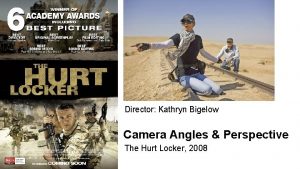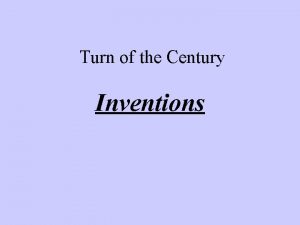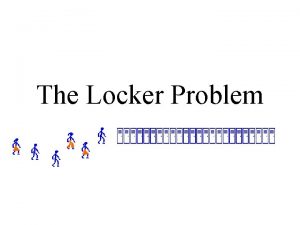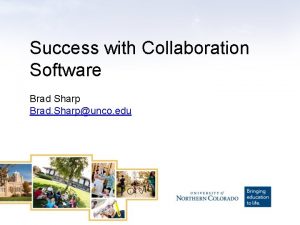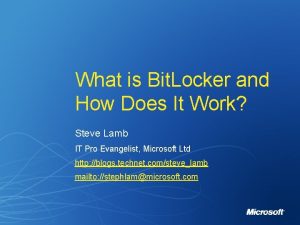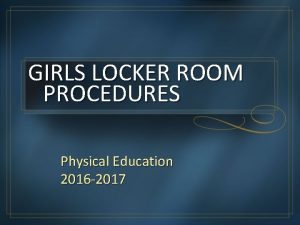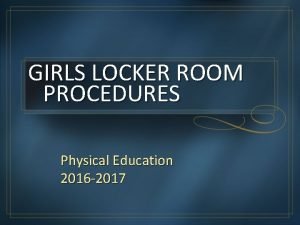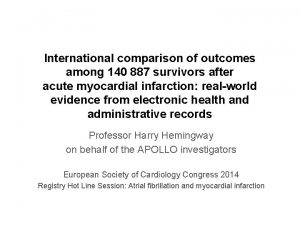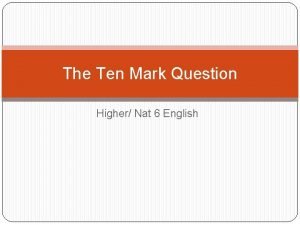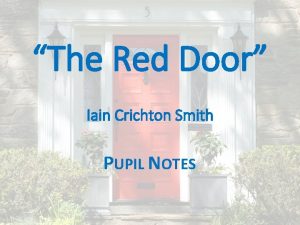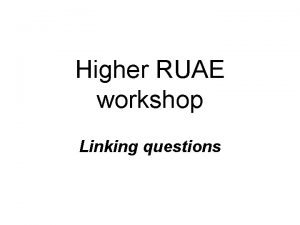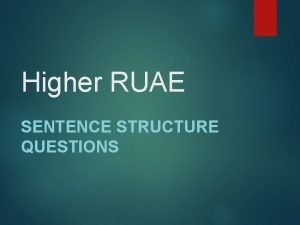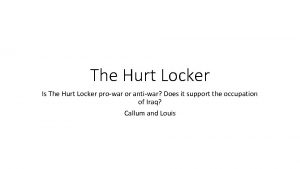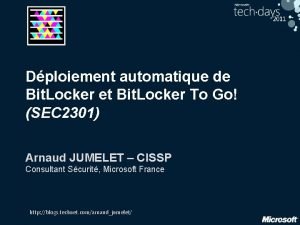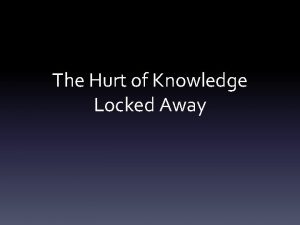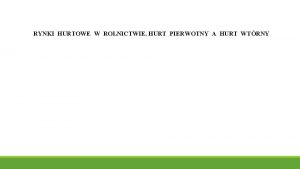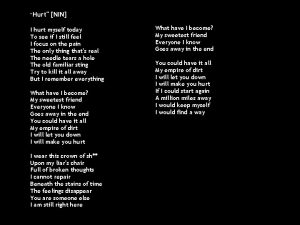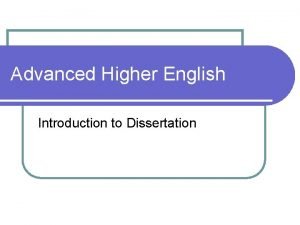The Hurt Locker Higher English The Hurt Locker























- Slides: 23

The Hurt Locker Higher English

The Hurt Locker Made in 2008 Director: Kathryn Bigelow Writer: Mark Boal Genre: War/Thriller Academy Awards: Best Picture, Best Director, Best Screenplay, Best Film Editing, Best Sound Mixing and Best Sound Editing.

Cast Sergeant First Class William James – Jeremy Renner Sergeant J. T. Sanborn – Anthony Mackie Specialist Owen Eldridge – Brian Geraghty Staff Sergeant Matthew Thompson – Guy Pearce

Themes Horrors of warfare Chaos of the warzone Destruction of the innocent Psychological impact of warfare Conflict Obsession Complexity of relationships

Film Terminology Mise en scene - refers to everything in front of the camera and how it is arranged, including set design, props, make-up, costumes, lighting, actors and composition. Diegetic sound – Is sound that the characters can hear, for example, gunshots, explosions, car engines and character dialogue. Non-diegetic sound – Is sound that the characters cannot hear, for example, the film’s soundtrack or a narrator’s voiceover.

Film Terminology Point of view shot – allows the viewer to see the action from the perspective of a particular character(s). Fast cutting – an editing technique which allows the viewer to see several consecutive shots of brief duration. It can be used to show lots of events are happening, or to imply chaos/energy.

Film Terminology Slow motion shot – a shot in which the action is slowed down. It can be used to create suspense or underline the importance of an incident. Close-up – Tightly frames a person or object. Close-ups are used to show detail, for example, the facial expression of a character or what they are doing with their hands.

Film Terminology Long shot – used typically for scene setting. It allows the viewer to appreciate the context and environment in which the action is taking place. Cross cut – an editing technique used to show action occurring at the same time in two different locations. The camera cuts away from one action to another to enable the viewer to appreciate how the story is developing in different locations.

Cinematic techniques – opening sequence Epigraph Hand-held camera Fast cutting Diegetic sound Non-diegetic sound Point of view shots High Angle shots Close-ups Slow motion

Epigraph The film begins with the epigraph: “The rush of battle is often a potent and lethal addiction, for war is a drug. ” This is quotation from Chris Hedges, a war correspondent for The New York Times. This quotation introduces the genre of the film and foreshadows James’ compulsion to place himself and his colleagues in dangerous situations.

Hand-held Camera Hand-held camera – is used for dizzying, disorientating effect. An immersive technique, this helps the viewer to experience the turbulent emotions being felt by the soldiers and the civilians as they appreciate an IED is in the vicinity. It also gives the footage a documentary-style aesthetic. The jerkiness and lack of focus are commensurate with mobile phone recordings, which adds to the realistic depiction of the warzone, as it suggests the images are being filmed by someone caught up in the chaos.

Fast Cutting Fast cutting – is evident at the start of the sequence when the action moves quickly from the robot’s perspective to shots of Iraqi civilians fleeing and the arrival of US troops. The blur of images conveys a sense of chaos, which reflects the panic experienced by the soldiers and civilians who are embroiled in a potentially deadly situation.

Fast Cutting Fast cutting is also used memorably at the conclusion of the opening sequence. The action cuts rapidly between Eldridge, Sanborn, Thompson and the insurgent butcher to build the tension before it reaches a climax with the detonation of the bomb and the death of Thompson.

Diegetic Sound Whir of the robot – a grating sound that adds to the tension by creating a sense of unease in the audience. People screaming – an unnerving sound that underlines the panic engulfing the citizens, which distresses the audience and makes the viewer sympathise with the plight of the Iraqi population.

Diegetic Sound Wail of sirens – creates a sense of foreboding and an ominous atmosphere. This sound is usually associated with emergencies, which foreshadows the detonation of the bomb and Thompson’s untimely death. Thompson’s heavy breathing – While wearing the bomb suit, Thompson’s breathing is amplified, which discomfits the viewer and draws attention to his mortality.

Non-diegetic Sound Drumbeat at the beginning of the opening sequence – This pounding rhythm helps to create tension at the start of the film. It also mirrors the thumping heartbeats of the soldiers and citizens who find themselves in a highly dangerous situation.

Non-diegetic Sound Discordant score – a scraping string score is used sporadically in the opening sequence for grating effect. The inharmonious sound unsettles the viewer and heightens the tension.

Point of View shots Robot’s point of view – After the epigraph, the film begins with a point of view shot from the perspective of something mechanical (we later learn it is a military robot) moving very quickly across the dusty ground. This is immediately disorientating for the viewer as they are witnessing the action from a highly unusual and disconcerting point of view. Moreover, the speed and lack of focus makes for rather nauseating viewing, reflecting the queasiness of the civilians and soldiers

Point of view shots Thompson’s point of view from inside the bomb suit – an immersive technique, this shot allows the viewer to experience the action from Thompson’s perspective. It makes us aware of his limited vision and the laborious nature of his movements. This becomes significant later in the sequence as his restricted mobility means he is unable to move outside the blast radius before the bomb is detonated.

Close-ups The IED – This device is shown in close-up to alert the viewer to the danger facing the troops and civilians. This helps to build tension by creating a sense of foreboding. The wagon breaking down – Close-up is used here to build unease by indicating that the unit will not be able to deactivate the bomb remotely. This results in Thompson attempting to disarm the device inside the blast radius, which ultimately leads to his death.

Close-ups The insurgent’s mobile phone – We see a close-up of this device to highlight its significance in the narrative. It causes the explosion that leads to Thompson’s death and causes him to be replaced by Sergeant James.

High Angle Shots Are used periodically throughout the opening sequence to convey the impression that the unit are being surreptitiously observed by above, possibly by insurgents. This contributes to the tension by suggesting that the soldiers are being spied on by enemy forces intent on causing them harm.

Slow motion The explosion at the climax of the opening sequence is filmed in slow motion to underline its importance and make the viewer aware of the devastation it causes. It also causes tension as it delays the outcome of the sequence by slowing down the action, which creates a cliffhanger effect.
 Kathryn bigelow legs
Kathryn bigelow legs The hurt locker google drive
The hurt locker google drive Interestspy
Interestspy Which insurance salesman invented the fountain pen in 1884
Which insurance salesman invented the fountain pen in 1884 Imagine you are in
Imagine you are in Smiley face writing
Smiley face writing Heart locker kalispell
Heart locker kalispell Credential locker
Credential locker Mylocker ausd
Mylocker ausd Unco sharepoint
Unco sharepoint Ken locker
Ken locker Wcl locker
Wcl locker Www.impacttestonline.com/benhogan
Www.impacttestonline.com/benhogan Pe locker room rules
Pe locker room rules Pe locker room rules
Pe locker room rules Fb
Fb Digital locker system
Digital locker system Dhl locker malta
Dhl locker malta Trumpf seam locker
Trumpf seam locker Sqa higher english understanding standards
Sqa higher english understanding standards Higher english 10 mark question
Higher english 10 mark question The red door by iain crichton smith
The red door by iain crichton smith Linking questions higher english
Linking questions higher english How to answer a sentence structure question
How to answer a sentence structure question
